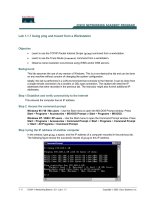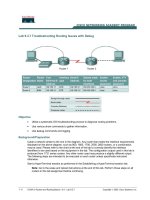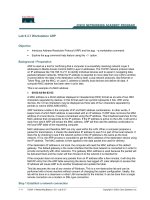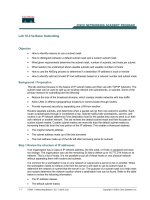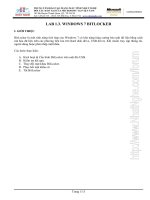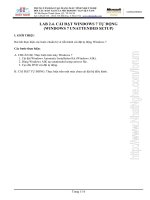Tài liệu Lab 2.3.7 OSI Model Characteristics and Devices pptx
Bạn đang xem bản rút gọn của tài liệu. Xem và tải ngay bản đầy đủ của tài liệu tại đây (66.6 KB, 2 trang )
1 - 2 CCNA 1: Networking Basics v 3.0 - Lab 2.3.7 Copyright 2003, Cisco Systems, Inc.
Lab 2.3.7 OSI Model Characteristics and Devices
Objective
• Name the seven layers of the OSI model, in order. Use a mnemonic.
• Describe the characteristics, functions and keywords relating to each layer.
• Describe the packaging units used to encapsulate each layer.
• Name the physical devices or components that operate at each layer.
Background
This lab will help to develop a better understanding of the seven layers of the OSI model. Specifically
as they relate to the most popular functioning networking model in existence, the TCP/IP model. The
Internet is based on TCP/IP. TCP/IP has become the standard language of networking. However,
the seven layers of the OSI model are the ones most commonly used to describe and compare
networking software and hardware from various vendors. It is very important to know both models
and be able to relate or map the layers of one to the other. An understanding of the TCP/IP model
and the protocols and utilities that operate at each layer is essential when troubleshooting.
Steps
1. List the seven layers of the OSI model from the top to the bottom. Give a mnemonic word for
each layer that can help you remember it. Then list the keywords and phrases that describe the
characteristics and function of each.
Layer # Name Mnemonic Key Words and
Description of Function
7
6
5
4
3
2
1
2 - 2 CCNA 1: Networking Basics v 3.0 - Lab 2.3.7 Copyright 2003, Cisco Systems, Inc.
2. List the seven layers of the OSI model and the encapsulation unit used to describe the data
grouping at each layer. Also list the networking devices that operate at each layer, if applicable.
Layer # Name Encapsulation Unit
or Logical Grouping
Devices or
Components that
Operate at this Layer
7
6
5
4
3
2
1
